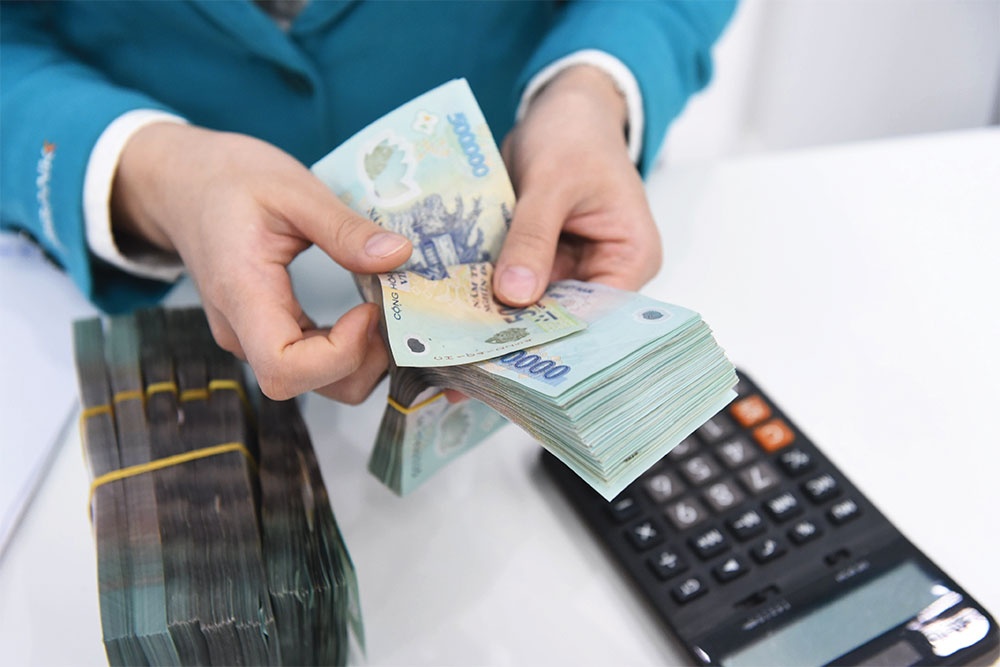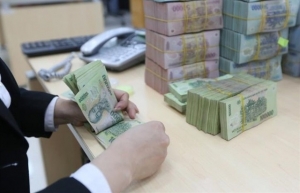Measures to boost trade underpins cautious stance
 |
| The government will this year look to stringently control the state budget deficit, local debt levels, and more, photo Dung Minh |
According to the Ministry of Finance (MoF), based on forecasts that there will be massive difficulties both at home and abroad, the state budget overspending in 2023 will likely sit at $19.8 billion, equivalent to 4.42 per cent of GDP.
The central budget deficit will reach more than $18.7 billion or 4.18 per cent of GDP; and local budget overspending will touch over $1.08 billion or 0.24 per cent of GDP.
The budget revenues this year are expected to be $70.46 billion, which is far lower than the realised figures of $77.6 billion last year.
“As the world economy’s growth is forecasted to be slow down, a number of major economies are facing danger of depression, and a very high hike of prices of oil and input materials is creating big pressure on global inflation,” the MoF said. “The political situation in the region and the wider world have become all the more complicated, coupled with climate change, natural disasters, and epidemics. All of these challenges have and will continue increasing risks and difficulties for the Vietnamese economy in 2023 and the country’s budget situation.”
According to an MoF report on Vietnam’s budget estimates for 2023, the state budget revenue structure will embrace $58 billion from domestic revenues – far lower than $61.8 billion recorded last year; $1.83 billion from crude oil exports if about eight million tonnes are exploited domestically and the average price stays at around $70 per barrel; $239.1 million from foreign assistance; and $10.39 billion from export and import activities – lower than $12.17 billion last year.
According to the World Bank, global growth is estimated to slump from 5.7 per cent in 2021 to 2.9 per cent in 2022.
“It is expected to hover around that pace over 2023-2024, as the war in Ukraine disrupts activity, investment, and trade in the near term, pent-up demand fades, and fiscal and monetary policy accommodation is withdrawn,” said the World Bank.
“Growth in advanced economies is projected to sharply decelerate from 5.1 per cent in 2021 to 2.6 per cent in 2022. Growth is expected to further moderate to 2.2 per cent in 2023, largely reflecting the further unwinding of the fiscal and monetary policy support provided during the pandemic.”
Risks include growth slowdown or stagflation in main export markets, further commodity price shocks, and continued disruption of global supply chains. Domestic challenges include continued labour shortages, the threat of higher inflation, and heightened financial sector risks, the World Bank warned.
The government has asked the Ministry of Industry and Trade (MoIT) to find sturdy measures to boost exports and closely control imports, and take advantages of commitments in signed free trade agreements. The MoIT also ordered to direct Vietnam’s trade offices overseas to seek more information from the markets where they are located to provide consultancy for the government and the prime minister on how to boost exports.
The MoF expects that the total central budget revenues in 2023 will be around $37.52 billion and the total local budget revenues will stand at $32.92 billion.
Meanwhile, it is estimated that Vietnam’s total state budget expenditure this year will be about $90.26 billion, up 16.3 per cent on 2022.
Spending for development investment will be $31.6 billion, and recurrent expenditures will be $50.96 billion. Other expenditures will also cover debt service of $4.47 billion; spending for salary reforms, retired salaries, and adjustments of subsidies, allowances, and social security pertaining to basic salaries ($543.47 million); and other expenditures ($2.68 billion).
To realise the budget targets this year, the government will carry out a raft of solutions.
“The government will focus on administering appropriate and effective fiscal policies, responding to complicated fluctuations of domestic and foreign situations, ensuring macroeconomic stability, controlling inflation, promoting growth, and ensuring major balances in the economy,” said MoF minister Ho Duc Phoc.
“In addition, we will continue to improve the state budget collection system, strengthen revenue management, and restructure revenue sources to ensure sustainability. We will also have to amend, supplement, and better the tax administration institution to ensure the correct and timely collection of taxes, fees, charges, and other revenues for the state budget.”
In 2023, the government will also stringently control the state budget deficit, local budget overspending, and local debt levels. It will also continue strengthening the examination and inspection of the borrowing and use of loan capital and debt repayment. The government will also restructure public debt in accordance with the Law on Public Debt Management, Phoc added.
Last year, the total state budget recorded a surplus of $9.67 billion. Total budget spending was estimated to be over $67.93 billion, up 8.1 per cent on-year. Meanwhile, the state budget revenue was estimated to hit $77.6 billion, up 13.8 per cent on-year. Several revenues have registered an annual increase, reflecting recovery in almost all sectors of the economy.
 | Budget resolutions set plan for 2023 Vietnam’s state budget performance is expected to see a deficit of billions of US dollars this year, with such a landscape fixed for next year – with warnings sounded about punishing violations in budget management and usage. |
 | Positive budget figures ensuring economic balance heading into 2023 The state budget landscape for January to the end of November witnessed positive figures, with enterprises gradually riding out the storm to ensure their performance. |
 | Performance on the up as illustrated by budget figures Contrary to projection of a deficit, Vietnam’s state budget landscape in 2022 has witnessed a major surplus, with enterprises in general gradually weathering difficulties to ensure their performance. |
What the stars mean:
★ Poor ★ ★ Promising ★★★ Good ★★★★ Very good ★★★★★ Exceptional
Related Contents
Latest News
More News
- Private capital funds as cornerstone of IFC plans (February 20, 2026 | 14:38)
- Priorities for building credibility and momentum within Vietnamese IFCs (February 20, 2026 | 14:29)
- How Hong Kong can bridge critical financial centre gaps (February 20, 2026 | 14:22)
- All global experiences useful for Vietnam’s international financial hub (February 20, 2026 | 14:16)
- Raised ties reaffirm strategic trust (February 20, 2026 | 14:06)
- Sustained growth can translate into income gains (February 19, 2026 | 18:55)
- The vision to maintain a stable monetary policy (February 19, 2026 | 08:50)
- Banking sector faces data governance hurdles in AI transition (February 19, 2026 | 08:00)
- AI leading to shift in banking roles (February 18, 2026 | 19:54)
- Digital banking enters season of transformation (February 16, 2026 | 09:00)

 Tag:
Tag:




















 Mobile Version
Mobile Version